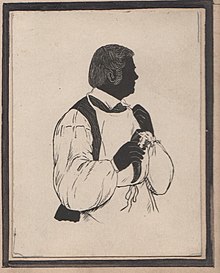Innkeeper

An innkeeper passes as an independent contractor or as an employee of a company's technical and commercial autonomously a restaurant business , hence the name derived restaurateur . The word "host" comes from the Germanic "werdum" for " host ". In contrast to the chef or restaurant specialist, the innkeeper is not a protected training occupation .
description
Innkeepers determine the organization of the business processes, issue instructions for the commercial, personnel and technical processes in the entire inn and restaurant business, hire staff and make decisions about investments. They coordinate and control service and reception and organize the processes in other functional areas (kitchen). They are also responsible for compliance with the relevant laws and regulations, in particular the protection of minors and non-smoking regulations . You are responsible for commercial accounting and gastronomic planning and set medium and long-term sales and turnover targets. They initiate and monitor the purchasing, storage and preparation and preparation of food and drinks, negotiate with suppliers and check the quality of the goods. In addition, they plan and control the cost of goods , monitor the processes in the kitchen and help determine the food and drink plans . In Germany, all innkeepers need a special certificate of suitability (without an examination), which is acquired in a course at the Chamber of Commerce and Industry .
Organizations
In 1873, the German Innkeepers Association (based in Berlin) was founded, to which a total of 485 associations with more than 30,000 members belonged in 1907; The organ of the association was "Das Gasthaus" (Berlin; since 1868). In November 1893 the Association of German Innkeepers (Leipzig) was established, to which mainly Central and Southern German associations belonged. Federal organs: "Zentralblatt für das Deutsche Gastwirtgewerbe" (Leipzig; since 1893), "Der deutsche Gastwirt" (Darmstadt; 1884) or the "Deutsche Wirtezeitung" (Stuttgart; 1891). Both associations work together under the name of United German Innkeepers - an international association of inn owners (Cologne; 1869), whose organ: "Weekly of the International Association of Inn Owners" (since 1869).
Law
Innkeepers as independent entrepreneurs are subject to the provisions of restaurant law under commercial law. In Germany, catering law was regulated nationwide until the federalism reform; since 2006, legislative power has been with the federal states. So far, the federal states of Baden-Württemberg , Brandenburg , Bremen , Hesse , Lower Saxony , Saxony , Thuringia and Saarland have enacted their own restaurant laws as state law.
The restaurant law regulates in particular the requirements for the granting and revocation of a restaurant permit (concession), if this is required under federal or state law for the operation of the restaurant , the scope of the permit, the conditions and the reasons for refusal as well as the various laws and ordinances issued special monitoring rules.
See also
literature
- Ulla Heise : The innkeeper. Businessman and comforter . Leipzig 1993, ISBN 3-361-00362-8
Web links
Individual evidence
- ^ Innkeeper . Employment Agency website. Retrieved October 19, 2012.
- ^ Meyers Großes Konversations-Lexikon, Volume 7, Leipzig 1907, p. 385
- ↑ Lower Saxony Licensing Act (NGastG) , accessed 19 April 2012